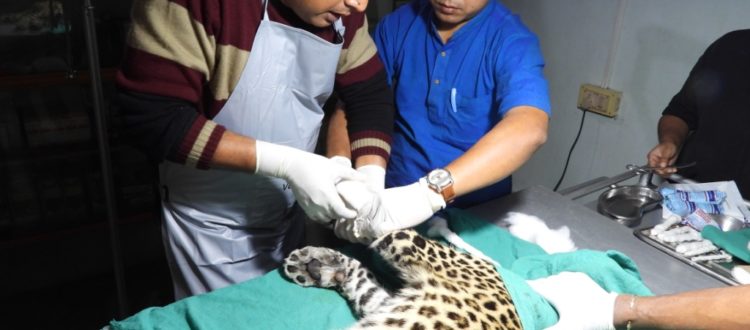Leopard nursed back from the brink of death and released back to the wild by WTI’s Wildlife Vet Team, Eastern Assam
Dibrugarh, 8 April 2020: This successful case of timely veterinary intervention and dedicated care enabled an injured leopard recover and return to the wild during the nationwide lockdown.
These narrow and deep trenches are dug and maintained in tea estates as rainwater drainage. Our MVS Team carefully lifted the injured leopard and shifted the animal to the nearest MVS Station (supported by HCL Foundation) at Guijan for medical attention.
[acx_slideshow name=”leopardnursed”]
The leopard showed symptoms of paraplegia (progressive paralysis) and after eleven days of palliative care involving infra-red lamp therapy and physiotherapy, our veterinary team decided to shift the leopard to the Centre for Wildlife Rehabilitation and Conservation (CWRC), Kaziranga that we operate with the Assam Forest Department. In partnership with IFAW, this wildlife rescue centre is well equipped with essential surgical facilities including gaseous anaesthesia and an operation theatre, together with a multi parameter patient monitoring system. This apart from basic lab diagnostics like haematology, serum chemistry, X-ray makes it a one of its kind facility for the rescue and rehabilitation of distressed wildlife in the country.
The young leopard which could scarcely move its limbs started showing progressive improvements, thanks to the expert medical attention provided by the veterinary team at CWRC comprising Drs Panjit Basumatary and Samshul Ali. A regimen of neurotropic vitamins and other supportive treatment followed by continuous infra-red, bamboo splints on its limbs and therapy combined with exercises with live prey over a period of more than three months at CWRC brought much improvement in the vitality of this leopard.
It was a major success for WTI’s Wildlife Veterinary teams when the leopard was finally released back to the wild on the 8th of April.
“We thought it was a hopeless case. The prognosis was dire, it was injured by people and we suspected spinal injury when we rescued it. We took a decision to take it to CWRC for better care, and it definitely feels very good to see this beautiful majestic female was released back to the wild”, exulted Dr Khanin Changmai, WTI’s veterinarian, Eastern Assam, the first responder to this rescue.
Even while India remains under lockdown, WTI is at work, committed to saving India’s Natural Heritage through holistic strategies with our wildlife rescue and rehabilitation teams, skilled wildlife biologists and conflict mitigation teams working 24 x 7 towards co-existence of people and wildlife.
Follow us on Twitter , Instagram and Facebook to see our work during Covid-19 crisis and help us through your contribution to save the country’s wilderness. Click here to donate.









